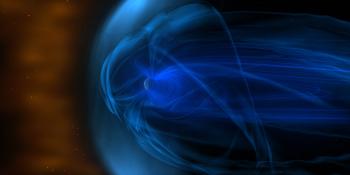Viewing archive of Thursday, 14 November 2002
Solar activity report
Any mentioned solar flare in this report has a scaling factor applied by the Space Weather Prediction Center (SWPC). Because of the SWPC scaling factor, solar flares are reported as 42% smaller than for the science quality data. The scaling factor has been removed from our archived solar flare data to reflect the true physical units.
Report of Solar-Geophysical Activity 2002 Nov 14 2200 UTCPrepared by the NOAA © SWPC and processed by SpaceWeatherLive.com
Joint USAF/NOAA Report of Solar and Geophysical Activity
SDF Number 318 Issued at 2200Z on 14 Nov 2002IA. Analysis of Solar Active Regions and Activity from 13-2100Z to 14-2100Z Solar activity was moderate. The largest event was a
long duration M1.0 x-ray flare, observed early in the period at
14/0017 UTC, accompanied by an extended parallel ribbon enhancement
visible in H-alpha imagery in the central and southeast portion of
Region 191 (S18W01). A partial halo CME was evident in LASCO
imagery following the flare, but did not appear to be
earth-directed. Region 191 appears to have developed a weak delta
configuration among its intermediate spots in the last 24 hours.
Region 192 (N13W34) exhibited moderate growth today and produced a
C-class flare late in the period. Region 195 (S16E65) produced
several C-class events, the largest being a C8/1n at 14/1345 UTC.
Two new regions were numbered today: 196 (S19W46) and 197 (N25E73).
IB. Solar Activity Forecast
Solar activity is expected to be
moderate, with a slight chance for a major flare during the next
three days. Regions 191 and 192 are potential sources of
significant flare activity. In addition, Region 197 appears bright
in EIT imagery and is expected to rotate into full view as a large
region with good flare potential.
IIA. Geophysical Activity Summary 13-2100Z to 14-2100Z
The geomagnetic field was at quiet to unsettled levels throughout the
period.
IIB. Geophysical Activity Forecast
The geomagnetic field is
expected to become more active over the course of the forecast
period with isolated minor storm periods possible, due to the
anticipated influence of a coronal hole rotating into geoeffective
heliographic longitudes.
III. Event Probabilities 15 Nov to 17 Nov
| Class M | 75% | 75% | 75% |
| Class X | 10% | 10% | 10% |
| Proton | 05% | 05% | 05% |
| PCAF | green | ||
IV. Penticton 10.7 cm Flux
Observed 14 Nov 184 Predicted 15 Nov-17 Nov 185/185/185 90 Day Mean 14 Nov 177
V. Geomagnetic A Indices
Observed Afr/Ap 13 Nov 016/012 Estimated Afr/Ap 14 Nov 010/010 Predicted Afr/Ap 15 Nov-17 Nov 015/020-020/030-018/025
VI. Geomagnetic Activity Probabilities 15 Nov to 17 Nov
| A. Middle Latitudes | |||
|---|---|---|---|
| Active | 30% | 40% | 35% |
| Minor storm | 10% | 15% | 10% |
| Major-severe storm | 01% | 01% | 01% |
| B. High Latitudes | |||
|---|---|---|---|
| Active | 35% | 45% | 30% |
| Minor storm | 10% | 15% | 15% |
| Major-severe storm | 05% | 05% | 05% |
All times in UTC
Latest news
Latest forum messages
Incoming & Unnumbered Active Regions 1804Ask your obscure/"stupid" space weather questions. 373Growth of Cycle 25 832AR4070 11Unspecified geomagnetic activity 2316
More topicsSupport SpaceWeatherLive.com!
A lot of people come to SpaceWeatherLive to follow the Sun's activity or if there is aurora to be seen, but with more traffic comes higher server costs. Consider a donation if you enjoy SpaceWeatherLive so we can keep the website online!

Space weather facts
| Last X-flare | 2025/03/28 | X1.1 |
| Last M-flare | 2025/04/22 | M1.3 |
| Last geomagnetic storm | 2025/04/21 | Kp5+ (G1) |
| Spotless days | |
|---|---|
| Last spotless day | 2022/06/08 |
| Monthly mean Sunspot Number | |
|---|---|
| March 2025 | 134.2 -20.4 |
| April 2025 | 121 -13.2 |
| Last 30 days | 114 -22.8 |


